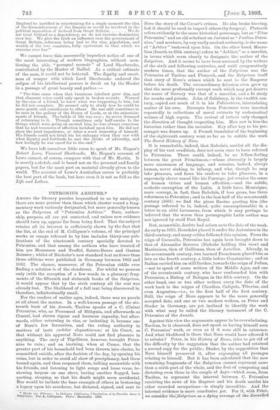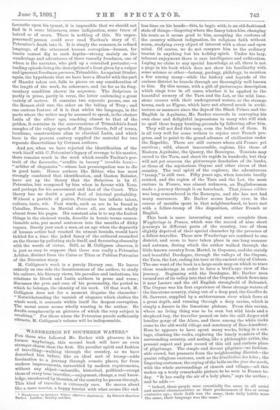PETRONDLIS ARBITER.*
AMONG the literary puzzles bequeathed to us by antiquity, there are none greater than those which cluster round a frag- mentary work variously designated, but more generally known as the Satyricon of "Petronius Arbiter." Date, author- ship, purpose, all are yet contested, and unless new evidence should turn up, appear far from being fixed, That the subject retains all its interest is sufficiently shown by the fact that the list, at the end of M. Oollignon's volume, of the principal works or essays referred to by him includes thirty-one pub- lications of the nineteenth century specially devoted to Petronius, and that among the authors who have treated of him are Mommsen and Teuffel, Sainte-Beuve and Gaston Boiasier ; whilst of Bilcheler's new standard text no fewer than three editions were published in Germany between 1862 and 1882. The chance, moreover, of the Petronian riddle ever finding a solution is of the slenderest. For whilst we possess only (with the exception of a few words in a glossary) frag- ments of the fifteenth and sixteenth books of the Satyricon, it would appear that by the sixth century all the rest was already lost. The likelihood of a full text being discovered is, therefore, infinitesimally small.
For the readers of earlier ages, indeed, there was no puzzle at all about the matter. In a well-known passage of the six- teenth book of his Annals, Tacitus speaks of a C. (Caine) Petronius, who, as Proconsul of Bithynia, and afterwards as Consul, had shown vigour and business capacity, but after- wards, either returning to vice, or imitating it, became one of Nero's few favourites, and the ruling authority in matters of taste (arbiter elegantiarum) at his Court, so that without his approval Nero could not find pleasure in anything. The envy of Tigellinus, however, brought Petro- nine to ruin ; and on learning, when at Cumze, that the greater part of his household had been thrown into chains, he committed suicide, after the fashion of the day, by opening his veins, but in order to avoid all show of precipitancy, had them bound again, and then reopened them, talking meanwhile with his friends, and listening to light songs and loose verse, be- stowing largess on one slave, having another flogged, ban- queting, sleeping, so that his death might seem accidental. Nor would he imitate the base example of others in bestowing a legacy upon his murderer, but dictated, signed, and sent to Mudd our P4trone ; aCritique Littiratire, l'Invitation et la Parodic Cans le Sate-icon. Par A. Collignon. Paris : Hachette. 1892. Nero the story of the OLe3ar's crimes. He also broke his ring, lest it should be used to imperil others (by forgery). Plutarch refers evidently to the same historical personage, but as "Titus Petronius," and an old scholiast on Juvenal as " Tublius Petro- nius," and nowhere, by any really ancient authority, is the name of "Arbiter" bestowed upon him. On the other hand, Macro- bius (fourth to fifth century) refers to "Arbiter," as a novelist, in terms which seem clearly to designate the author of the Satyricon, And it seems to have been assumed by the writers of the sixth and following centuries, and until comparatively modern times, that the author of the Satyricon was the Petronius of Tacitus and Plutarch, and the Satyricon itself that story of Nero's crimes which he sent to the Emperor before his death. The extraordinary delusion even grew up that the most profoundly corrupt work which may yet deserve the name of literary was that of a moralist, and a fit study for monks and priests. John of Salisbury, in the twelfth cen- tury, copied out much of it in his Policraticus, intercalating matter of his own. Excerpts from Petronius were inserted repeatedly in collections of moral extracts by ecclesiastical writers of high repute. The revival of letters only changed the direction of thought respecting him. Men saw in him the historian rather than the moralist. Key after key to his per- sonages was drawn up. A French translator of the beginning of the eighteenth century went so far as to entitle the work The Secret History of Nero.
It is remarkable, indeed, that Rabelais, amidst all the dis- play of his vast erudition, does not seem once to have referred to Petronius. There could, indeed, be no fellow-feeling between the great Frenchman,—whose obscenity is largely mere coarseness of language, and remains, indeed, always human, never sinking to infamy, and who, though he may take pleasure, and force his readers to take pleasure, in a supremely clever rascal like his Panurge, yet retains the sense of human virtue and human affection,—and the subtle, cesthetic corruption of the Latin, A little later, Montaigne, more corrupt, in fact, than Rabelais, if less gross, has three references to Petronius ; and in the last half of the seventeenth century (1661) we find the pious Racine quoting him (the passage referred to is, indeed, quite unexceptionable) in a letter to an abbe Levasseur, from which it may perhaps be inferred that the worse than pornographic Latin author was not ignored by staid Port Royal.
But, meanwhile, doubts had arisen as to the date of the work. As early as 1618, Bourdelot placed it under the Antonines in the third century, and many critics followed this opinion. From the reign of Oaracalla, Petronius has again been brought down to that of Alexander Severna (Niebuhr holding this view) and Maximinus, then of Gallienus, then of Aurelian. Already, in the seventeenth century, two learned Frenchmen placed him as late as the fourth century, a little before Constantine ; and an Italian carried him on still further, towards the reign of Julian, —not to speak of some writers of the Middle Ages, and one of the seventeenth century, who have confounded him with Petronius, a Bishop of Bologna in the fifth century. On the other hand, one or two other writers carry the date of the work back to the reigns of Claudius, Caligula, Tiberius, and even Angustus,--i.e., to the first half of the first century. Still, the reign of Nero appears to be the more generally accepted date, and one or two modern writers, as Peter and Studer in Germany, are yet inclined to identify the work with what may be called the literary testament of the C. Petronius of the Annals.
Against this view the arguments appear to be overwhelming. Tacitus, be it observed, does not speak as having himself seen C. Petronius' work, or even as if it were still in existence. And what likelihood is there that Nero would have allowed it to subsist P Peter, in his History of Rome, tries to get rid of the difficulty by the suggestion that the author had retained a second copy for the public; Studer, by the supposition that Nero himself preserved it, after expunging all passages relating to himself. But it has been calculated that the now remaining fragments of the Satyricon cannot represent more than a sixth-part of the whole, and the feat of composing and dictating even these in the couple of days—which seem, from Tacitus, to represent the interval between O. Petronius receiving the news of his disgrace and his death amidst his other recorded occupations—is simply incredible. And the internal evidence is more conclusive yet. For if, with Peter, we consider the:Satyricon as a dying revenge of the discarded favourite upon his tyrant, it is impossible that we should not find in it some bitterness, some indignation, some trace of hatred or of scorn. There is nothing of this. No unpre- possessed!' person could ever read Tacitus's story of C. Petronius's death into it. It is simply the romance, in refined language, of the uttermost human corruption—human, for beasts cannot dig to such depths—strung mainly on the wanderings and adventures of three rascally freedmen, one of whom is the narrator, who pick up a conceited poetaster,—a leading episode being the description of a feast given by a vulgar and ignorant freedman parvenu, Trinialehio. As against Studer, again, the hypothesis that we have here a Hamlet with the part of Hamlet taken out, falls to pieces on any consideration of the length of the work, its coherence, and (so far as its frag- mentary condition shown) ite sequence. The Satyricon is partly in prose, partly in verse, the latter embracing a great variety of metres. It contains two separate poems, one on the Roman civil war, the other on the taking of Troy ; and one curious feature of it is that whilst the language, in the parts where the writer may be assumed to speak, is the choicer Latin of the silver age, reaching almost to that of the golden, it contains in the conversations of Trimalchio's feast samples of the vulgar speech of Magna GrEecia, full of terms, locutions, constructions alien to classical Latin, and which have in the present century supplied the material for two separate dissertations by German authors.
And yet, when we have rejected the identification of the work itself with C. Petronius's legacy of revenge to his master, there remains much in the work which recalls Tacitus's por- trait of the favourite, "erudite in luxury" (erudito luxu)— " arbiter of elegancies "—whose last preoccupation was to die in good taste. Hence authors like Ritter, who has most strongly combated that identification, and Gaston Boissier, have set up the theory that the Satyricon is by C. Petronius, but composed by him when in favour with Nero, and perhaps for his amusement and that of the Court. This theory has no doubt a good deal of internal probability. Without a particle of genius, Petronius has infinite talent, culture, taste, wit. Foul words, such as are to be found in Catullus, Horace, in Martial above all, are almost wholly absent from his pages. His constant aim is to say the foulest things in the choicest words, describe in heroic terms unmen- tionable acts, put moral sentences into the mouths of filthy rogues. Surely just such a man, at an age when the depravity of human action had reached its utmost bounds, would have tickled for a time the jaded fancy of the cultured scoundrel on the throne by polluting style itself, and flavouring obscenity with the words of virtue. Still, as M. Collignon observes, it is just as easy to suppose that there was really a Petronius Arbiter, distinct from the Caius or Titus or Publius Petronius of the Neronian story.
. M. Collignon's work is a purely literary one. He leaves entirely on one side the licentiousness of the author, to study his culture, his literary views, his parodies and imitations, his relations to Greek and Latin authors in prose and verse ; discusses the pros. and eons, of his personality, the period to which he belongs, the identity of his work. Of that work, M.
Collignon does not for a moment disguise the character : "Notwithstanding the varnish of elegance which clothes the whole work, it conceals within itself the deepest corruption. The moral sense seems wholly wanting in the author. He dwells complacently on pictures of which the very subject is revolting." For those whom the Petronian puzzle sufficiently attracts, M. Collignon's volume will be indispensable.







































 Previous page
Previous page